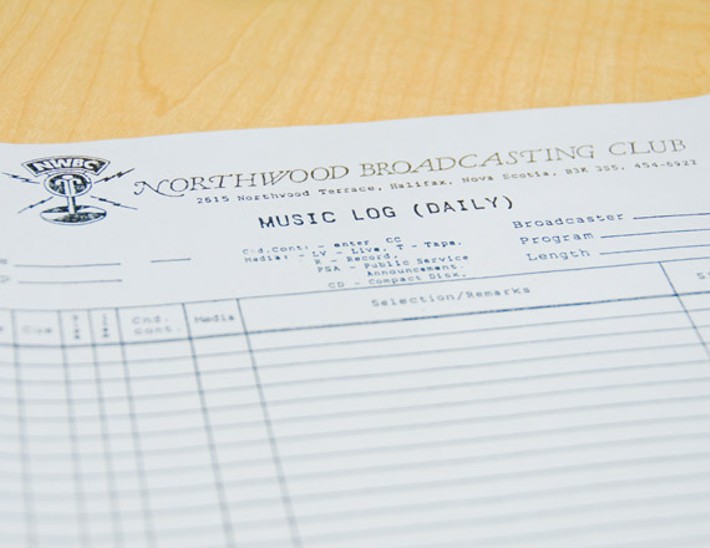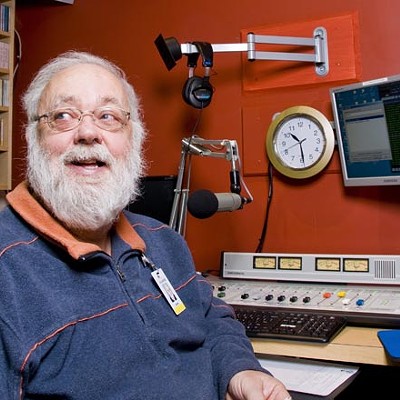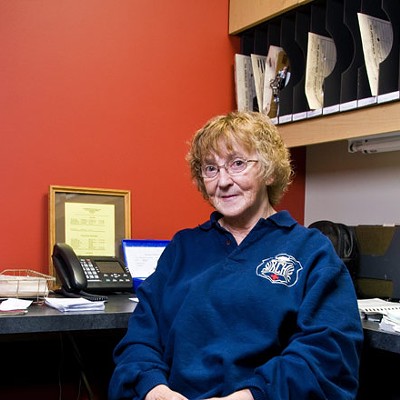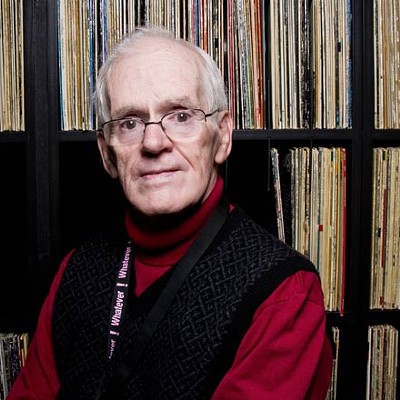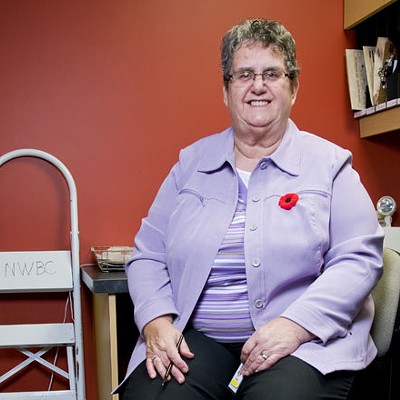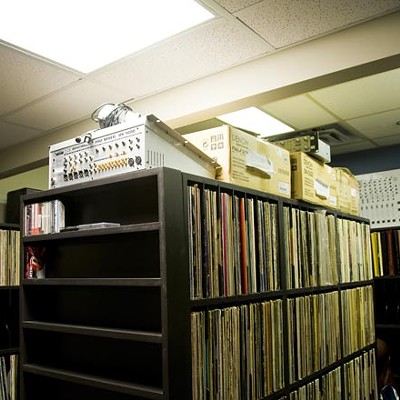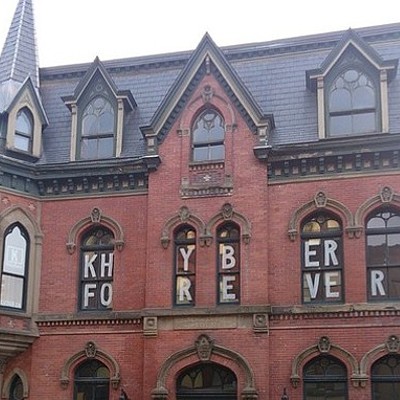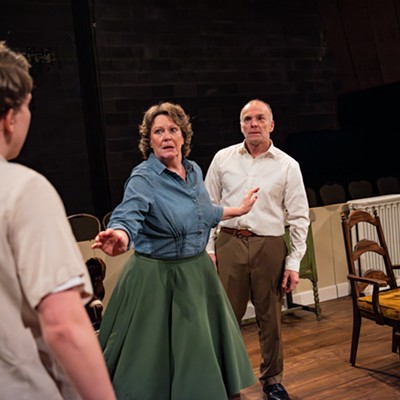The Northwood Broadcasting Club booth is not easy to find. It's in Northwood's Edward L. Roach Centre for Living building, part of the Halifax seniors' residence and nursing home facility at the corner of North Street and Northwood Terrace. Go past the busy lobby, filled with men and women in walkers and wheelchairs, visitors and caregivers, but don't go as far as the beauty salon. Look for the On Air sign above the door.
The main room's a tight squeeze, but there's enough space to examine the tall shelves filled with record albums, lining the walls like a DJ's dream. Not all the records have been catalogued yet, most are donations from listeners. There's Doris Day, Guy Lombardo, Glen Campbell, Zamfir. For those with a little more rock in their step, there's Meat Loaf, Beach Boys, Styx, Toto.
But while the kids rediscover vinyl, most of the NWBC programmers, the majority of whom are men in their 60s and 70s, rarely use the record player. Over 14,000 songs are already converted to MP3s, which are digitally indexed, and can be searched and played with a few easy keyboard clicks.
Dale MacKeigan arrives around 9:30 on Monday morning, as he has almost every week for about the last nine or 10 years. He can't remember exactly how long.
The 70-year-old volunteer with the white hair and the shy, open smile is joined today by Jim Francis, the current NWBC president. Francis usually isn't here on Mondays, but he's filling in for longtime radio announcer Maisie Mitchell, who's in the hospital. Every day, Monday to Friday, 10am to noon, from this room, MacKeigan, Francis, Mitchell and 11 other volunteers---few are actually Northwood residents---rotate shifts, taking requests and playing music. They broadcast to over 300,000 households in Nova Scotia and Prince Edward Island, through EastLink TV, channel 10. If you're lucky enough to be home at that time, it's the easy listening music that plays while community announcement text rolls.
Francis prepares to go on air in the booth. MacKeigan stays out in the main area, by the phone. He swings around in his office chair to talk, while organizing small slips of paper on which he'll write down the phone requests to pass to Francis.
After retiring, MacKeigan started volunteering at NWBC when Mitchell needed assistance answering the phones. Lorne Perry, who currently hosts Thursday's In the Mood show, was ill and needed a temporary replacement, so MacKeigan trained to fill in. According to MacKeigan, Perry is a bit hard of hearing, so he still helps out on Thursdays.
MacKeigan's always been a live music guy. He performs with Northwood Players and at his church's dinner theatre and yet, when he first started volunteering at the station it still took some convincing to talk on-air. "I was used to a live audience. I had done some entertaining, but to sit down in front of a mic and keep track of what you're playing, it's altogether different," MacKeigan says.
It's startling when MacKeigan explains that he also performed in minstrel shows, many years ago, back when they were still fashionable. (According to Robin Winks' The Blacks in Canada: a history, groups like the Smokey Mokes Minstrels were still playing to packed Nova Scotia houses as late as 1965.) It's clear that these shows are still a fond personal memory for MacKeigan, who speaks with warmth and sincerity, though he doesn't seem to completely understand the reasons why they ended: "It doesn't matter if the guy was red, black or yellow, we always got along. We had a ball," he explains matter-of-factly, from behind his large, round glasses.
Like many of his listeners, MacKeigan enjoys hearing old-time tunes from the 1920s to 1940s, but other than NWBC and Seaside FM in Eastern Passage, you'd be hard-pressed to find this generation's music on commercial radio, which explains NWBC's popularity with the silver set. MacKeigan listens to country, but not the new-fangled country rock that dominates commercial radio: "No slam-banging on drums and guitars, I enjoy going to a dance where the music's danceable," he says. He likes The Beatles and The Animals, too, but doesn't care much for rap, "unless it's telling a decent story."
At home, MacKeigan says his wife Sue, who works the phone for his Wednesday show Say it with Music, gets mad at him for the music and stereo equipment he's accumulated in a dedicated second bedroom. MacKeigan usually makes his program line-up from there, or comes into the station the day before to pick out songs, about 25. In two hours an announcer can play up to 35 songs, but most will end up being caller requests.
He includes some of the "modern stuff," too. MacKeigan struggles to think of an example. "I would play something, for instance, by Elton John that is good. I don't play a lot by him, though."
"You don't play anything by him," Francis calls out from inside the booth.
"Oh, come off it, Jim!" MacKeigan jokes back.
It's minutes before going live. Francis is watching the TV in the corner of the booth, waiting for channel 10 to announce it's time for NWBC to begin broadcasting.
Thanks to an $8,500 grant from the federal government's New Horizons for Seniors program, the renovated booth is outfitted with new limiters and boards, which makes set-up and recording---all their shows are taped, in case of a complaint (no problems, so far)---as easy as pushing a couple of buttons. Francis says it's a much more sophisticated system than their old one, but he didn't have the learning curve of MacKeigan and the others because he also volunteers at 106.9 Sackville Community Radio, which uses the same equipment.
In fact, once he's done at NWBC, he'll head over to the classic country station for a four-hour shift. As club president, Francis takes obvious pride in demonstrating how the system works, how each button functions, how well, he says, the volunteers all get along.
Francis is a broad-chested, trimly bearded Newfoundlander, with strong ties to the community. On Saturdays he hosts NWBC's Newfie Brew show and a Newfoundland show at 106.9, with his wife, Bea. Francis is also a regular at the Newfoundland Social Club, performing with the band Special Blend. He records music too, including country singer Jim Richard, a Canso native whose voice is an eery dead-ringer for Johnny Cash.
"I grew up in music," says Francis as he lines up a few songs. "When I was 13 years old, I played dances all the time." When Francis left the military, he performed in the Stadacona Band of Maritime Forces Atlantic for 26 years. "Then I got into the restaurant business, for exactly 10 years, Harvey's on Wyse Road," he says. "The similarities between Harvey's and the Stadacona Band is that both are people businesses. We're dealing with people all the time, and that's what I enjoy."
Besides the 14,000-plus songs available digitally in NWBC's system, Francis also brings in a three-gigabyte memory stick that can hold extra songs of his own. With so many songs and so many requests, programming, to say the least, can be patchwork erratic---it can go from a spiritual hymn to "Harper Valley PTA," no problem---but that's also the beauty of NWBC, and what satisfies these music lovers.
"You play what you want to play, by instinct, by feel, by the requests," Francis explains.
There's very little talk, other than a quick mention of the weather, and the introduction of the song. But sometimes a song needs a little more context. Chuckling, Francis reads a request slip. "Betty called in, must be from Newfoundland," he says into the mic. "She wants us to play a song in memory of Ross. Now, when someone back home in Newfoundland passes on we usually have a big, big kitchen party, and so I'm sure this was her intent right there with The Irish Rovers' 'Wasn't That a Party.'"
While the show is on air, usually the office door is closed to avoid distractions or wandering residents. Not on this morning. A diminutive woman shuffles into the room, all smiles for strangers. "Sure are a lot of records," she repeats about four or five times before greeting MacKeigan. After a few minutes she turns around again, and leaves with a wave: "I'm going back out so I can hear Jim's music."
Tuesday morning is Dave Abbott's program, Musical Treasures. Abbott, 67, who also volunteers at Seaside, is another NWBC vet. He started at the station back in 1996, but says he's been purchasing music for about 57 years. "I listened to it before, but never dreamed I would collect it, and never stop collecting it," says the retired water commission worker, who also enjoys demonstrating the new technology. "Girlfriend can verify that. I always give her a tip at the end of the show...on the horses."
"Girlfriend" is Gayle Lyons, 69, who comes in to answer the phones for Abbott. The two toss good-natured, groaning barbs back and forth like a '60s sitcom. Lyons enjoys "happy, upbeat music like The Beatles," but was never a music fan like Abbott.
"When I first met David I didn't know..." Lyons says, cutting up her own custom, handwritten and photocopied request sheets, which she'll slip to Abbott under the door. "I like songs but I couldn't tell you who was singing. Now, I'm getting a little better. Nothing like Dave though, he's a walking encyclopedia of music. But I know everything about hoarding because of him," she laughs.
Abbott is a fan of old country and pop, circa 1950s and '60s. He scours the secondhand shops and the internet for treasures, "better than smoking or gambling or strange women...wait, I've got one now..." he says slyly, waiting for Lyons' reaction. "I'll buy anything that spins around the turntable."
He examines the shelves, looking for the right song to start the show, pulling out a Perry Como CD and then quickly exchanges it for Ray Hill's "Don't Close Your Eyes."
"This is what I like, see, I can play what I like," he says. "I'm not being told what to play...except by the listeners."
Right on cue, as soon as Abbott's theme song begins, the phone starts ringing. "I try to get in as many personal songs as I can in the two hours," he says, reaching towards the red button, "but I may get in half a dozen because of all the requests."
In 1990, the movie Pump Up the Volume, starring Christian Slater as a renegade pirate radio operator who gives other teenagers a voice, spoke to a generation that felt disenfranchised by its schools, parents and community. In so many ways these announcers and their obsession with music is like that of gawky teenage boys, buying tons of music and sharing it with their loyal girfriends, who aren't always as enthusiastic. There's something deliciously rebellious about NWBC, too: A daily broadcast that doesn't care about musical trends or commercial interests, that exists solely to entertain a demographic broadly ignored by mainstream entertainment. Radio announcers who lack the slick wordplay of a morning show DJ, and who don't mind if they drop the CD case---and it takes them a few seconds to pick it up---while on air.
According to Francis, the Northwood Broadcasting Club was started 20 years ago by Percy Bowser, who is now 90. A former navy man and an active volunteer, Bowser served as founding general manager, program director, president and broadcaster. Originally an in-house service for the Northwood facilities, NWBC began broadcasting to the general public through Dartmouth Cable, over 12 years ago. Dartmouth Cable's service expanded through Halifax, Sackville and Bedford, and then when EastLink amalgamated all the local services, NWBC's coverage crossed the entire province, as well as into PEI. NWBC still does some in-house programming for Northwood, though they avoid competing with bingo hours.
John Verlinden, corporate director of communications/community engagement for Northwood, is impressed with the dedication of the volunteers, who have been broadcasting daily without fail, with rarely a break other than preempted programming or a technical glitch.
Verlinden says that the radio program is part of Northwood's broader community outreach initiatives, designed to keep seniors active. "It's enabled us to reach out to a much larger audience," he says. "People have gotten to know Northwood as more than just a nursing home. It's about sharing information, sharing opportunities and sharing music, in this case."
He says that the show is piped into the home's public area televisions, and many residents have their favourite announcers and shows. "They enjoy certain kinds of music, they love to phone in and ask for different songs by different artists," Verlinden says. "It gives them a chance to talk to the people who are doing the show. There's value in just that."
Every year Verlinden attends the 50+ Expo, an annual Halifax seniors' lifestyle and health event. "They're treated like rock stars," he says. "We always bring the broadcasters with us. They're the centre of attention."
Star power comes with devoted fans, too. "Bernice will call from Summerside, Evelyn will call in memory of her husband, which she's done every month for the last six years..." Francis gives a roll-call of the regular listeners by first name. In between songs he opens the mail, which MacKeigan has fetched for him. Inside one small envelope there's a card with straight, but watery handwriting. A fan has sent a $12 cheque--- a response to a recent pledge drive---and a thank-you note kindly asking the announcers to give some background information about the song before it's played, so she has something to think about while she's listening.
The sound of the phone ringing in the background becomes its own soundtrack. Whenever the lull's too long, someone will make a comment about the silence, occasionally checking the line to make sure nothing's malfunctioning.
"It's gotten so popular the phone's ringing all the time," says Lyons in between rapid calls. She jokes that for some listeners, like Bernice and Jean and Mickey, you can fill out the request slips ahead of time. "You get to know the voices. When I first came it was funny because they'd give a request and I'd ask, 'Who is this?' and they'd get quite indignant: 'You don't know me?'"
The phone rings again. Lyons knows the caller. "You want Peter, Paul and Mary? Ah hah, just a lucky guess..."
Callers often want to hear the same songs, which they request over and over. "That's what they live for and that's what's important to them, so we try to accommodate," says Francis. "The only thing is if you played all the requests it would be the same songs, the same show, every week."
Francis gets around the problem by suggesting other songs from the same artist, and by constantly introducing new songs into the mix. "That's why the first half-hour you get your own songs in, so you can introduce new songs to the listening audience so it's not the same-old, same-old."
But really, the worst is when the requests stop. "Now, you know when you're not hearing from a certain person---we're catering to older people---they've passed on," says Abbott. "One lady was a great Merle Haggard fan. And she always wanted to hear Merle Haggard, didn't matter which song it was. So I just knew she passed on."
"We hear wonderful stories from people who say their wife recently passed away and they used to dance to the music on NWBC, and every time they turn on the show it brings back very fond memories," says Verlinden.
This doesn't come as a surprise to Cindy Hamon-Hill, a PhD psychology student at Dalhousie University. Her Masters thesis investigated how the brain organizes, or parses, music. Hamon-Hill says that music plays a role in social identification. Just like it is for teenagers looking for social acceptance, it's also important for seniors in homes sharing physical living space with strangers for the first time. "It's a strong factor in important social bonding," she says, "connecting and identifying a love of music from a certain era or genre."
Biographical memories are also strongly associated with the music we hear, says Hamon-Hill.
"If a certain event is important enough to be processed for long term, when it's paired with music, the memory is stronger," she says. She explains that background shopping mall music won't have much affect, but when we pay attention to a song---often without being consciously aware of it---we're taking in its complexities, its "tone, pitch, phrasing and melody."
Now, imagine you're listening to that song at a surprise birthday party or waltzing to it at your daughter's wedding. When you hear that song later, "all it takes is one to trigger the other." That moment is now intrinsically connected to that music, thanks to complicated processes in our brains that take up circuits and store both those parts together.
So, again, imagine that elderly couple listening to NWBC one morning, sharing a memory of dancing together, years ago. "Both the wonderful memory and the wonderful music is reactivated," says Hamon-Hill. "When you're in love, you can relive that feeling of being in love."
It's not just the listening audiences that benefit from NWBC's unchained melodies, either. This diehard crew of volunteers agrees that they're getting something in return, too. "It keeps me going," says MacKeigan. "I'm getting to an age where I'm thinking of slowing down a bit, but if I did, what would I give up? I'm 70 years old. I don't know how long I can do it for, but I'll do it as long as I'm able."
Sue Carter Flinn is arts and deputy editor for The Coast. When she was five, she invented a game called "Runaround Sue," named after the 1961 Dion song.


